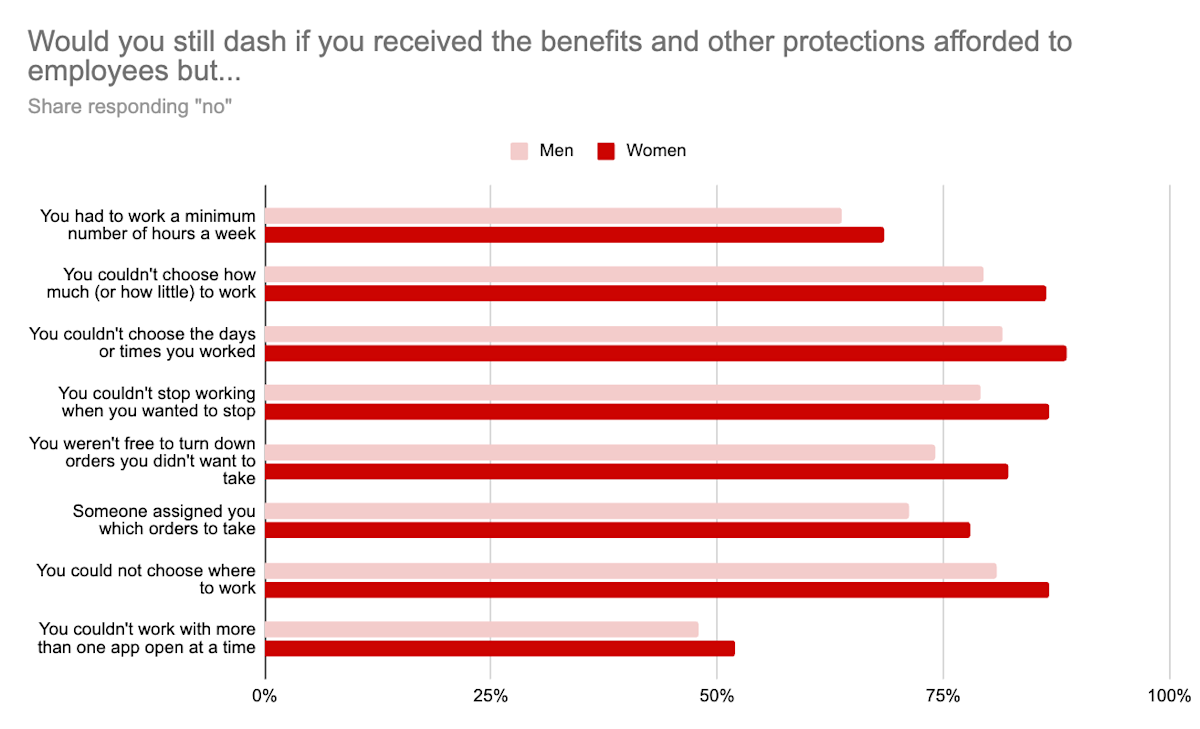Our November 2023 Dasher survey shows — once again — that well over half of Dashers surveyed (60%) identify as women. This is perhaps not surprising since, as we’ve reported previously, women are drawn to the platform because of the flexibility it offers and because they believe it’s safer than rideshare.
Although Dashers of all genders overwhelmingly prefer to maintain their independent contractor status, more women than men expressed this sentiment (93% compared to 87%). Why might this be? In this post, we explore two explanations: first, women are often balancing many priorities — like caregiving, paid work, and more. And second, while the majority of Dashers of both genders dash for supplemental, rather than primary, income, this is even more true for women. Together, they demonstrate the unique value dashing offers women — and how crucial it is to preserve that flexibility.
Juggling priorities
Based on a study by Pew Research, women typically spend more time caring for loved ones and doing housework, even when they are also responsible for generating significant household income. And a survey of over 5,000 American adults conducted in June 2022 found that women place greater importance on having flexibility to balance work and personal life (80% versus 76% among men), and this increases to 90% among mothers. It is no surprise then that many women are drawn to the flexibility that platform-based work offers.
Research from the Progressive Policy Institute points out that platform-based work offers caregivers several advantages over alternatives like traditional part-time work: better schedule control, downward and upward flexibility (the ability to increase or decrease hours), and earnings consistency (similar hourly pay no matter how many hours are worked). Similarly, research from the Mercatus Center finds that women gravitate toward work that offers more temporal flexibility — that is, the ability to choose one’s working hours.
Our survey findings bear this out. Women Dashers are more likely to be a parent (52% compared to 44% among men) or caregiver (45% compared to 35%). They’re also more likely to say that dashing allows them to be more present or available at home (82% compared to 74%), and 61% said that if flexible work was not available, they would spend less time caring for loved ones (compared to 54% of men). Nearly 2 in 5 women Dashers (39%) say that one of the main reasons they dash is because they’re able to earn money but also have time to care for a child or loved one (compared to fewer than 1 in 4 men, or 23%).
As one Dasher says, “I’m a single mom with twins and it’s hard to be able to work with their schedule. So, I DoorDash when I can.”
Earning supplemental income
When asked about their other sources of income or responsibilities, we learned that women Dashers are less likely to be exclusively working in the gig economy (15%) compared to 22% of men surveyed. Rather, they dash when they need to earn supplemental income. For example, they’re more likely to increase their hours during times of financial stress (65% compared to 51%) or when their costs are going up (57% compared to 48%). Women are also more likely to dash to make up for reduced hours or lost income at their main job (61% compared to 51%).
Why might women need supplemental income more than men? This could be driven by several things. It’s well established that, on average, women earn less than men — even after controlling for hours worked, education level, and other factors. Furthermore, women respondents are more likely to be single parents: 28%, compared to 15% among men. Unlike traditional work with fixed schedules, dashing allows women to work as many or as few hours as they want, earning income when they need it — and to skip dashing entirely when they don’t.
Independent work is critical for women
The pattern is clear: while flexibility and supplemental income are important to all Dashers, the disproportionate demands on women’s time makes that flexibility even more crucial for them. This is why efforts to convert Dashers to employees or employee-like workers would be especially consequential for women. Research on women and flexible work concurs, stating that “challenges to the legal classification of such workers in particular could disproportionately hinder women’s participation in independent work.”
In fact, when we asked whether respondents would still dash if employment-like conditions were imposed (such as dictating where or when people could dash, or whether they could turn down orders), women said “no” at higher rates than men for each of the eight conditions we asked about (see chart below). For example, 87% of women said they wouldn’t dash if they received the benefits and other protections afforded to employees, but couldn’t stop working when they wanted to stop, compared to 79% among men.

Working moms tell us in their own words how important this flexibility is.
“As a mom, my child’s school schedule is not flexible, nor is his extracurricular activities or important school functions. My chef instructor job’s schedule is also sporadic. DoorDash’s free schedule allows me to be hands on with my parenting and my child’s school functions. It also allows me to continue my dream job. While I love my dream job as an instructor, it doesn’t pay the bills. With DoorDash being schedule free, it allows me to work when I can but also pay the bills.” — Hai Yen


